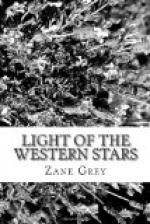Suddenly Russ, the keener of the stag-hounds, raised his head and growled. Madeline feared he might have scented a mountain-lion or wildcat. She quieted him and carefully looked around. To each side was an irregular line of massive blocks of stone that had weathered from the crags. The little glade was open and grassy, with here a pine-tree, there a boulder. The outlet seemed to go down into a wilderness of canyons and ridges. Looking in this direction, Madeline saw the slight, dark figure of a woman coming stealthily along under the pines. Madeline was amazed, then a little frightened, for that stealthy walk from tree to tree was suggestive of secrecy, if nothing worse.
Presently the woman was joined by a tall man who carried a package, which he gave to her. They came on up the glade and appeared to be talking earnestly. In another moment Madeline recognized Stewart. She had no greater feeling of surprise than had at first been hers. But for the next moment she scarcely thought at all—merely watched the couple approaching. In a flash came back her former curiosity as to Stewart’s strange absences from camp, and then with the return of her doubt of him the recognition of the woman. The small, dark head, the brown face, the big eyes—Madeline now saw distinctly—belonged to the Mexican girl Bonita. Stewart had met her there. This was the secret of his lonely trips, taken ever since he had come to work for Madeline. This secluded glade was a rendezvous. He had her hidden there.
Quietly Madeline arose, with a gesture to the dogs, and went back along the trail toward camp. Succeeding her surprise was a feeling of sorrow that Stewart’s regeneration had not been complete. Sorrow gave place to insufferable distrust that while she had been romancing about this cowboy, dreaming of her good influence over him, he had been merely base. Somehow it stung her. Stewart had been nothing to her, she thought, yet she had been proud of him. She tried to revolve the thing, to be fair to him, when every instinctive tendency was to expel him, and all pertaining to him, from her thoughts. And her effort at sympathy, at extenuation, failed utterly before her pride. Exerting her will-power, she dismissed Stewart from her mind.
Madeline did not think of him again till late that afternoon, when, as she was leaving her tent to join several of her guests, Stewart appeared suddenly in her path.
“Miss Hammond, I saw your tracks down the trail,” he began, eagerly, but his tone was easy and natural. “I’m thinking—well, maybe you sure got the idea—”
“I do not wish for an explanation,” interrupted Madeline.
Stewart gave a slight start. His manner had a semblance of the old, cool audacity. As he looked down at her it subtly changed.
What effrontery, Madeline thought, to face her before her guests with an explanation of his conduct! Suddenly she felt an inward flash of fire that was pain, so strange, so incomprehensible, that her mind whirled. Then anger possessed her, not at Stewart, but at herself, that anything could rouse in her a raw emotion. She stood there, outwardly cold, serene, with level, haughty eyes upon Stewart; but inwardly she was burning with rage and shame.




